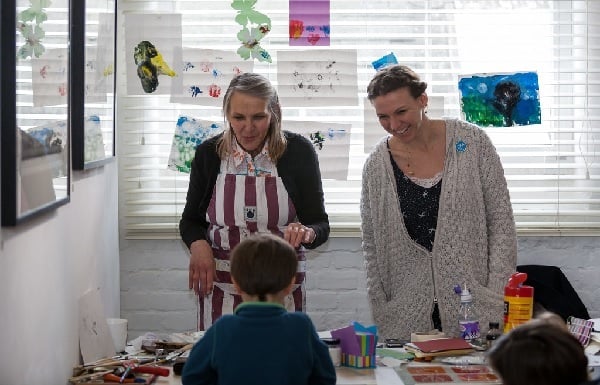
Creative People and Places in Medway & Swale, 2013
Photo: spaghettiweston.com
‘Priority places’ list to guide increased ACE investment
New capital and business development programmes are in the pipeline as ACE looks to "refresh" the criteria for existing funding streams and "broaden" its National Portfolio.
Arts Council England (ACE) will create a list of "priority places" for future investment and interventions under its new strategy.
A greater share of the funder's budget – 75% up from 69% – will go towards a "broader" National Portfolio from 2023, which will encompass a range of arts organisations, museums, libraries and the engagement scheme Creative People and Places.
Whether this amounts to more funding overall won't be known until the next Spending Review. Funding to kickstart the 10-year strategy Let's Create was exhausted on ACE's emergency funding response to the coronavirus last summer, leaving only "limited investment" to implement it.
READ MORE:
- Can libraries deliver culture for all? ACE's new strategy revealed
- Three reasons why ACE's new strategy won't cut it
"We will therefore refresh the criteria for our existing major investment programmes, including the National Portfolio, Creative People and Places, National Lottery Project Grants, and Developing Your Creative Practice, so that they can better help deliver the three outcomes – Creative People, Cultural Communities and A Creative & Cultural Country," a new delivery plan says.
The document, delayed a year due to the pandemic, outlines several changes expected between July 2021 and April 2024, including a refreshed Artsmark programme, implementing the findings of the Durham Commission, and a new capital fund for refurbishing libraries.
ACE aims to compile its 'priority places' list by June. Areas with a relatively high cultural offer will need to show "tangible evidence of improved collaborative working" to continue receiving funding, while places with the lowest cultural engagement will get targeted help.
"We will increase our intervention – both financial and in terms of our staff development time – in these places, and we will track the impact of this increased investment of resources through improvements in cultural engagement."
'Increased efficiency'
ACE says mergers may be necessary as it expects organisations to become entreprenurial.
Four principles – ambition and quality, inclusivity and relevance, environmental responsibility and dynamism – "describe what we believe well-run cultural businesses need to look like to merit public investment" the funder says.
"In considering where we make our investments in the future, we will increasingly seek tangible evidence of applicants successfully applying these principles."
Organisations can be of greater benefit to communities post-pandemic by developing new products and services. "There will also need to be an increased focus on efficiency," the delivery plan says.
A new Reset & Innovation programme will support National Portfolio Organisations (NPOs) and others to explore new business models and develop shared service agreements and partnerships inside and outside the sector.
The funder says it too will change: it plans to set clear environmental targets and, "most importantly, we will set targets to ensure we are an inclusive employer whose workforce is reflective of contemporary England," it says.
ACE has not responded to questions about what diversity targets it intends to apply to NPOs.
Trickle up funding?
Funding for freelancers will be prioritised for those deemed most in need – early career creatives and those who come from backgrounds underrepresented in the cultural sector.
It says it cannot afford to support everyone but recognises the current threats to retaining talent.
"The pandemic has… highlighted that this ‘trickle down’ model is not working effectively, and that the Arts Council will need to provide more direct support to individual creative practitioners."
ACE will "pay particular attention" to the role of libraries and museums in building community engagement, the delivery plan says, and place "growing focus on the way that culture can improve health and wellbeing outcomes".
It will work also with DCMS to improve the Government Indemnity Scheme and provide additional investment to try minimise the disruption to touring caused by Brexit.
While ACE is considering opening lottery grants up to non-accredited museums, it is calling for more investigation into repatriating global artefacts: "We want… to encourage collaborative and inclusive approaches to working with those collections, based on a clearer understanding of their origins."
CPP pulled into portfolio
The Creative People and Places (CPP) scheme will become one strand of the “broader and more inclusive National Portfolio” from 2022.
CPP aims to increase arts attendance and participation through local consortia that empower communities to shape cultural activity in their areas. Until now it has been a stand-alone scheme with its own application processes; in future it will be part of ACE’s triennial funding cycle.
CPP consortia already cover 45 local authority areas through 33 projects, led by organisations ranging from local authorities to teaching hospitals, football clubs and shopping centres.
Another 66 areas of England with the lowest levels of engagement in arts and culture, including Birmingham, Leicester, Salford and some London boroughs, will each be eligible to apply for up to £750,000 of its £23m budget.
ACE has reduced the match funding requirement from 25% to 15% per cent of total project budget, recognising that “the pressures of the pandemic make match funding a little more challenging”.
Existing consortia, some of which run beyond April 2022, can apply for funding to extend their work.
£7m will go to projects in the North, £5.8m in the Midlands, £5.7m in the South East, £3.2m in London; and £1.2m in the South West of England.
Join the Discussion
You must be logged in to post a comment.